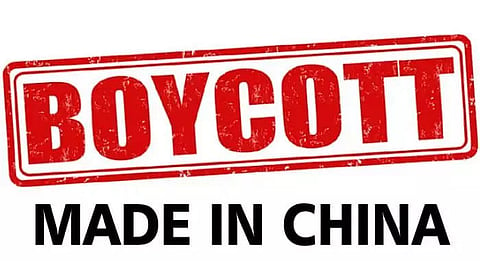
- Home
- Live Blog
- Breaking News
- Top Headlines
- Cities
- NE News
- Sentinel Media
- Sports
- Education
- Jobs

New Delhi/Mumbai: India can afford to
boycott "Made in China" products only by developing domestic industries and
diversifying its sources of import. Incidentally, the opposition to the flood
of cheap 'Made in China' products in the domestic market has been steadily growing
over the years. However, the sentiment got a major push due to the ongoing
Himalayan stand-off between the Asian giants.
Accordingly, industry and trade experts contended that a move to fully boycott Chinese products will not just require time but also strategic policy intervention and support to develop domestic industries. Similarly, duty hikes and implementation of quality control norms would be required to stave-off dumping activity.
Besides, trade analysts cited the need to source imports from other countries, thereby, reducing dependence on Chinese industries.
"Indian consumers may boycott Chinese goods such as toys, leather bags, mobile handsets and other goods in the lower price range," Rupa Naik, Senior Director, MVIRDC World Trade Center Mumbai said.
At present, India's trade deficit with China is declining due to imposition of antidumping duty in sectors like steel.
In FY20, India imported $65.1 billion worth of "Made in China" products, and exported only about $16.6 billion to the East Asian country, thereby, recording a trade deficit of $48.5 billion.
"There is a case for encouraging domestic small scale producers of low value added goods like toys and household appliances vis-e-vis imports not just from China but also other nations," said Sankar Chakraborti, Group CEO of Acuite Ratings and Research.
"Higher trade barriers with China is likely to lead to fresh investments in the manufacturing sector in India by foreign players, given the large size of the domestic market."
Furthermore, Chakr-aborti pointed out that indigenous suppliers in sectors such as chemicals and bulk drugs, capital goods, auto components and consumer durables can benefit if imports are discouraged or additional duties are imposed. "A concerted effort by the government and the industry to encourage the development of indigenous manufacturing capacities in India as a substation for imports will lead to an increase in private sector capital expenditures," Chakraborti said. "It will be important to ensure two things to build a large investment pipeline in the private manufacturing sector. One is adequate trade protection to these indigenously developed capacities till they attain cost competitiveness at the global level and also ensuring availability of debt funding from banks for such new projects."
As per an Acuite ratings' report, India can potentially reduce its trade deficit with China by $8.4 billion over FY21-22, via rationalisation of just a quarter of its imports from the East Asian country.
In terms of import barriers, highly placed sources have indicated that certain high volume import products from China may attract steeper tariffs. These tariffs might have different range and scope such as imposition of countervailing and anti-dumping duty or a basic custom duty hike.
Several products such as printing paper, toys, toners, AC compressors, general use electrical wires and switches are amongst items that have been identified for either a tariff or quality control standard hike, sources said. (IANS)